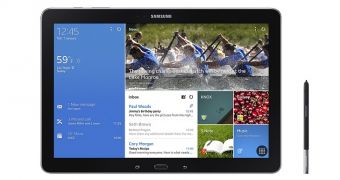As most of you already know by now, Samsung has recently launched a bunch of new tablets with big screens, including the Galaxy TabPRO 12.2 and Galaxy NotePRO 12.2. The devices are aimed at enterprise users and are bundled with multi-tasking abilities and other apt features, but the question is, will they sell?
New research posted by DigiTimes claims the new tablets are likely to be met with sluggish interest and won’t see strong demand, at least in the short term. This statement is motivated by the fact the new tablets feature a weaker price/performance ratio than most notebook computers on the market.
On top of that, it is pointed out that Android enterprise applications are yet to see a wide adoption among business users, as they are deemed inferior than their PC-based counterparts.
Currently, the shipment forecast for Samsung’s 12.2-inch tablets is pretty low, being set at around one million units for 2014.
Due to so-called profitability concerns, Samsung has stopped focusing on its notebook products, abandoning its low-price strategies initiated in the second half of 2013.
Subsequently, the Korean tech giant saw its quarterly notebook shipments drop to 2-2.5 million units (from a previous 3.4-4 million).
Samsung is currently hoping its large tablets will prove a worthy enough alternative for enterprise users to ditch their notebook products, in their favor.
Instead of focusing on upgrading things in the hardware department, Samsung put all its efforts into a redesigned users interface and applications, hoping that in this way tablet market penetration will increase.
However, the new research believes these efforts are not enough and the difficulty to compete against notebook will persist mostly because of pricing. Samsung’s entry level 12.2-inch tablet, the TabPRO 12.2 starts at $649 / €470, while the high-end NotePRO 12.2 climbs up from $849 / €615, which is the price of a mid-range/high-end laptop.
There’s also a coolness factor to be taken into consideration when tablets are concerned and this is probably what Samsung is betting on.
This particular strategy can be spotted in Samsung’s latest video commercial for the tablets, in which a Surface tablet with keyboard dock is mistaken for a laptop. This causes the owner to feel embarrassment when confronted by two hip Samsung slate users.
But will social acceptance prime in the face of better specifications, improved memory and storage capabilities? Probably not, because unlike what we’re shown in commercials, having capable machines to rely on while at work is much more important than having a nice-looking device.

 14 DAY TRIAL //
14 DAY TRIAL //